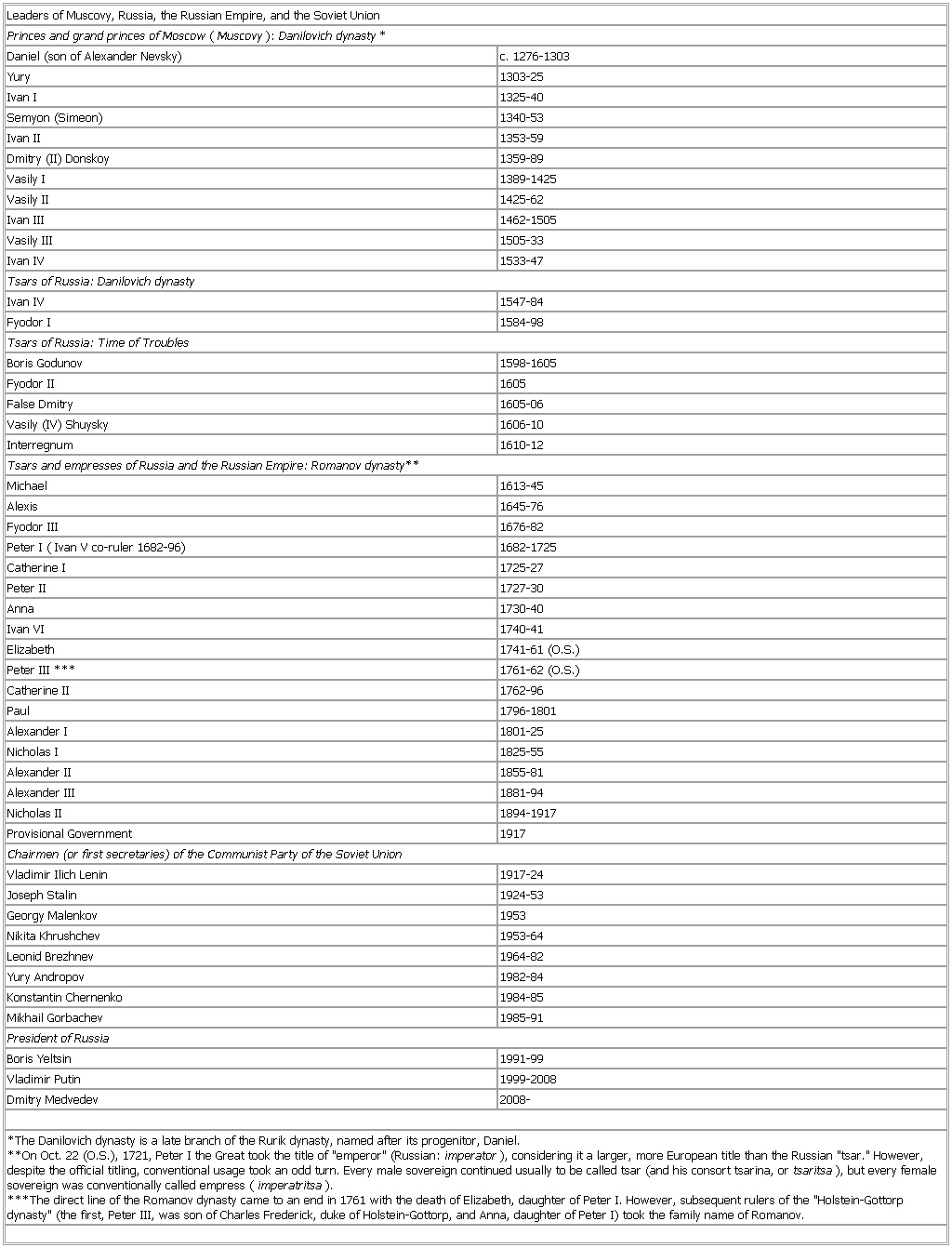Leaders of Muscovy, Russia, the Russian Empire, and the Soviet Union
- Leaders of Muscovy, Russia, the Russian Empire, and the Soviet Union
-
Leaders of Muscovy, Russia, the Russian Empire, and the Soviet Union
Princes and grand princes of Moscow (
Muscovy)
: Danilovich dynasty*
Daniel (son of Alexander Nevsky) c. 1276-1303
Yury 1303-25
Tsars of Russia: Danilovich dynasty
Tsars of Russia: Time of Troubles
Interregnum 1610-12
Provisional Government 1917
President of Russia
*The Danilovich dynasty is a late branch of the Rurik dynasty, named after its progenitor, Daniel.
**
On Oct.
22 (
O.
S.),
1721,
Peter I the Great took the title of "
emperor" (
Russian: imperator),
considering it a larger,
more European title than the Russian "
tsar."
However,
despite the official titling,
conventional usage took an odd turn.
Every male sovereign continued usually to be called tsar (
and his consort tsarina,
or tsaritsa),
but every female sovereign was conventionally called empress (
imperatritsa).
***
The direct line of the Romanov dynasty came to an end in 1761 with the death of Elizabeth,
daughter of Peter I.
However,
subsequent rulers of the "
Holstein-
Gottorp dynasty" (
the first,
Peter III,
was son of Charles Frederick,
duke of Holstein-
Gottorp,
and Anna,
daughter of Peter I)
took the family name of Romanov.
See as table:
* * *
Universalium.
2010.
Look at other dictionaries:
Russia — /rush euh/, n. 1. Also called Russian Empire. Russian, Rossiya. a former empire in E Europe and N and W Asia: overthrown by the Russian Revolution 1917. Cap.: St. Petersburg (1703 1917). 2. See Union of Soviet Socialist Republics. 3. See Russian… … Universalium
Russian architecture — follows a tradition whose roots were established in the Eastern Slavic state of Kievan Rus . After the fall of Kiev, Russian architectural history continued in the principalities of Vladimir Suzdal, and Novgorod, and the succeeding states of… … Wikipedia
History of Russia — The history of Russia begins with that of the East Slavs. The first East Slavic state, Kievan Rus , adopted Christianity from the Byzantine Empire in 988, [cite web|title=Kievan Rus and Mongol Periods|url=http://www.shsu.edu/ his… … Wikipedia
Russia — <p></p> <p></p> Introduction ::Russia <p></p> Background: <p></p> Founded in the 12th century, the Principality of Muscovy, was able to emerge from over 200 years of Mongol domination (13th 15th… … The World Factbook
Russian nationalism — See also: Radical nationalism in Russia Russian nationalism is a term referring to a Russian form of nationalism. Russian nationalism has a long history dating from the days of Muscovy to Russian Empire, and continued in some form in the Soviet… … Wikipedia
List of English words of Russian origin — Including English, contain words most likely borrowed from the Russian language. Not all of the words are truly fluent Russian or Slavic origin. Some of them co exist in other Slavic languages and it is difficult to decide whether they made… … Wikipedia
Anarchism in Russia — Russian anarchism is anarchism in Russia or among Russians. Bakunin and the anarchists exile In 1848, on his return to Paris, Michel Bakunin published a fiery tirade against Russia, which caused his expulsion from France. The revolutionary… … Wikipedia
History of the Ukrainian minority in Poland — The history of the Ukrainian minority in Poland dates back to the Late Middle Ages,[1] preceding the 14th century Galicia–Volhynia Wars between Casimir III the Great of Poland, and Liubartas of Lithuania. Following the extinction of the Rurikid… … Wikipedia
Ivan the Terrible — For other uses, see Ivan the Terrible (disambiguation). Ivan IV the Terrible Ivan IV the Terrible Tsar of All Russia Reign … Wikipedia
History of the Jews in Romania — The history of Jews in Romania concerns the Jews of Romania and of Romanian origins, from their first mention on what is nowadays Romanian territory. Minimal until the 18th century, the size of the Jewish population increased after around 1850,… … Wikipedia

